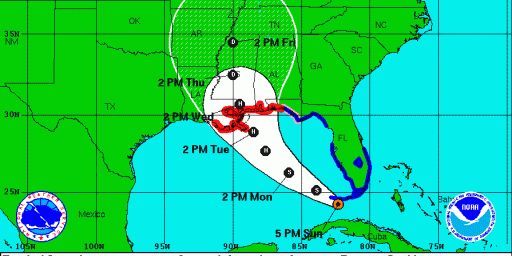Will Katrina Response Harm U.S. Foreign Policy
Brookings scholar Richard N. Haass believes the televised images from our response to Hurricane Katrina will have a profound impact on U.S. foreign policy. I respect his work Haass’ work a great deal. Indeed, I used his 1994 book Intervention: The Use of American Military Force in the Post-Cold War World several times in my professorial days. He makes some salient points.
Storm Warning – How the flood compromises U.S. foreign policy (Slate, Sept. 9)
The images seen around the world communicated a lack of competence and considerable chaos and suffering. The dominant overseas reaction has been sympathy mixed with shock and horror at what was seen by many as evidence of racism and a reminder of the extreme poverty in which many Americans live. America’s enemies indulged in schadenfreude. Hugo Chávez could not resist the chance to taunt President Bush; North Korea radio linked the U.S. “defeat” in Iraq with its “defeat” by Katrina; jihadists celebrated what had happened and the possibility the price of oil would soar even higher. The world’s only remaining superpower appeared to be anything but. In an era of 24-hour satellite television and the Internet, public diplomacy is about who Americans are and what they do, not just what they say. Unlike Las Vegas, what happens here does not stay here.
Haass overstates things a bit here. Yes, those who already hate America will use these images against us, especially when controlled through the lens of state television stations that display only the bad. Such is life. On the other hand, billions of dollars in aid are pouring in from around the world. The fact that even superpowers aren’t immune from the ravages of nature emphasizes our common humanity and offers opportunities to put differences aside.
The global impact goes beyond impressions. A priority of this administration’s foreign policy is to promote democracy around the world. But the attractiveness of the American model, and the ability of the United States to be an effective advocate for more democratic, capitalist societies, which had already been weakened by the disarray in Iraq, is now weaker still as a result of the disarray at home. It will be more difficult to make the case for free markets and more open societies if the results of such reforms come to be associated with the disorder seen in New Orleans.
This is largely correct. Indeed, our own domestic statists are already pointing to this disaster as an argument for nationalized health care, nationalized police powers, and so forth. And, like the previous paragraph, autocrats who control the flow of information can make that case to their people. In free societies, though, the aftermath of Katrina will soon show the free market–granted, augmented with quite a large public subsidy–rebuild the Gulf Coast region better than it was before the disaster. And even the ability to casually absorb perhaps several hundred billion dollars of damage without blinking is a tribute to our free enterprise system. The wealth came from somewhere and it sure wasn’t government.
Katrina will also have an impact on how citizens of the United States view foreign policy. The enormous problems and costs associated with the hurricane will raise additional questions about the ability of the United States to “stay the course” in Iraq. The aftermath of the catastrophe will inevitably increase political pressure on President Bush to begin to reduce the U.S. involvement in Iraq and refocus U.S. resources at home, be it on the expensive reconstruction of flood-ravaged areas or on improving the country’s capacity to deal with future disasters of this magnitude.
Probably so and probably a good thing. Americans have always believed in “splendid isolation” and our necessary involvement in world affairs has always been reluctant and required eloquent leadership. If President Bush can’t convince the public that Iraq is in our best interests and that we need to be there for the long haul, then we’ll have to get out sooner rather than later. This remains very much an open question, however.
A similar debate can be expected about the military. The National Guard is being used in unforeseen ways in Iraq, and it is clearly needed in foreseeable ways at home. The National Guard will not be able to do it all. Homeland security requirements, be they derived from hurricanes or terrorists, are and will be extensive. This reality highlights the fact that the Guard will not forever be available for overseas duty on anything like the current scale. The need clearly exists to expand the active duty Army, now too small to carry out its assigned tasks of fighting traditional wars and dealing with difficult aftermaths such as we are witnessing in Iraq.
The irony is that the National Guard has, for the past thirty-plus years, existed primarily as a part of the Total Force. Perhaps it’s time to rethink having a National Guard that answers first to state governors. Or, alternatively, it’s time to massively expand the Army, Navy, Marine Corps, and Air Force Reserve as a federal augmentation force with a National Guard rump left as state militia, deployable only under true national emergencies signaled by a formal Declaration of War by Congress.
(Update: Interestingly, Iraq War critic Kevin Drum does not “consider this a very strong argument against the war in Iraq, since no one suggests that National Guard troops should be kept permanently in the U.S. to deal with natural disasters” while a disillusioned Republican Steve Bainbridge believes the one-day delay in getting the National Guard to New Orleans caused by the war is “probably going to give the criticism of the administration and the GOP real traction with people of good sense and good will … as it should.”)
U.S. energy policy or, to be coldly honest, the lack of one, is another reality that Katrina exposes. This time it was a storm in the vicinity of important refineries, but next time it could be instability in any one of the major oil-producing countries or simply the cumulative result of the growth in world demand for oil outstripping the growth in world supply. Americans cannot drill or diversify or substitute their way out of this shortage. The United States must act to cut its consumption of oil, something that can be accomplished most efficiently with new regulations mandating substantially higher fuel economy for all vehicles sold in the country. Unfortunately, this is precisely what the legislation recently passed by Congress failed to do.
I agree that we don’t have much of an energy policy. He’s flat wrong, though, that substitutes forms of energy and diversifcation won’t work. When oil was cheap and plentiful–which is to say, all but a few months in the history of the country–there was little incentive to develop those alternatives. Now that the price appears to be permanently higher owing to increased demand from surging economies abroad and other factors, that’s likely to change.
Government has a role in that change in terms of subsidizing research that won’t pan out for several years and offering tax and regulatory breaks to build the infrastructure needed for alternative fuels (Ethanol85, electric, hydrogen, etc.) and to incentivize consumers to make the short term investments of switching over.
via Dan Drezner






I think the hurricane gives us the chance we should be looking for to get out of Iraq, and fast. We need the manpower and the money to rebuild the Gulf Coast. Everyone can clearly see that, both within the US and outside. We can just say, shucks, we wanted to “stay the course” but we have this little problem at home and we can’t afford to do both at once so we have to take care of things here. If we are needed back in Iraq in a few years, we’ll consider returning. TTFN.
Oh, that our leaders, of either party, could grasp this simple notion and kill two birds with one stone.
It is so elegant, that it just can’t be possible. Or can it? Let’s hope.
This is an issue for the world, really. Face it. The us will no longer be the world’s police officer. Japan, China, ROK, you have the responsibility for dealing with Mad Kim. Gulf Emirates, it is your job to deal with a nuclear Iran. Europe, see how far trade or bribes or ransom will get you in dealng with thugs. Like it or not, Americans will withdraw from the world. Without any subsidies, once the price of petroleum gets high enough, the alternatives will come forth and the reasons for involvement in the hopless Arab part of the world will fade. Here comes isolationist America, and it is not entirely Bush’s fault, it is the fault as well of the rest of the world.